.
A Postmodern Sublime

Eco+poetics is not Nature poetry. If traditional Nature poetry is a
meditation on (the pastoral beauty of) a landscape, eco+poetics
describes both the bird and the bulldozer. Not a transcendent
prayer nor a travelogue, it denotes an invasion. If Nature poetry
colonizes, tracks and contains a wilderness, traps it in a dichotomy
(Nature vs Humanity), if it is predatory and voyeuristic, eco+poetics
is a provocation; it is cinéma vérité.
Writing a poem is a little like terraforming, making use of available
resources to create an artificially assembled and self-sustaining
ecosystem of thought. It's elements (a poem) interact with an
environment (readers and their sociopolitical context) to leave a
lasting impact, it's meaning.
James Englehart in Ecopoetry Manifesto describes eco+poetry
as connection. And while I don't agree with everything he declares,
I accept his notion that it is;
"a tension between numerous disciplines that surround it - an interdisciplinary creature, whose purview includes science and the arts."
Eco+poetics implies a call to action, implores stewardship,
and upholds an ethos of concern; the poet-observer as an
agent for environmental change. The poet-observer as a
postmodern moralist, and the poet-observer as activist.
In today's climate, there is no current landscape, no
ecosystem that is untouched by the clang of human
intervention, by technology spiralling out of control,
toxic by-products soaking the edges of everything.
Writing a poem about Nature that ignores its politicization
seems hypocritical.
An 18th C. notion of the Sublime fears and reveres Mother
Nature, holds it up as magnificent and powerful; it reveres
the beauty of a hurricane. But an eco+poetical sensibility
implicates a Revised Sublime, populates a wilderness with
(the calamity of) people. This leads to awesome spectacles
of ecological disaster, surreal devastations of war waged
on a landscape even if bathed in a breathtaking sunset.
A Revised Sublime contains this tension as a warning.
It is a complex beauty entangled in power, like oil on
water or acid on earth.
Eco+poetics presents an environment-in-crisis as a tool
for political change. It insinuates interconnectedness, and
begs for redress. Maybe it is a desperate plea to
expand the Golden Rule into a higher consciousness,
an (innate?) need to apply equal respect to every
non-human life. A nod to the Nepalese for their
respect for all life, and in great reverence for
aboriginal values, a Revised Sublime exposes the
impact of large-scale human activity on ecosystems.
Beginning simply, with the form of a poem, and
transcending through pipelines past hungry polar
bears, it rises through noxious air in one interconnected
breath. Conversely, Richard Lowe's scheme to get-kids
back-to-nature implies that we have somehow left it.
Really?! Separate? As if ...
An eco+poetic message reminds readers that bulldozers
and birds share the same air. Aware of the poet/poem/poetics
(and all related industries from lumber to EMFs), it soars
beyond itself to become the voice of change within a larger
literary 'ecosystem', a habit of mind that recognizes unavoidable
connections between the complex sociopolitical realities of
culture and natural ecologies. And taking it further, then
wages war.
As it turns out, anyone with lungs and breath has a voice
(if not a responsibility) to defend an ethos of interconnection,
to terraform new habits of mind, one word, one breath, at a time.
Simple, really.

0 Comments:
Post a Comment
<< Home